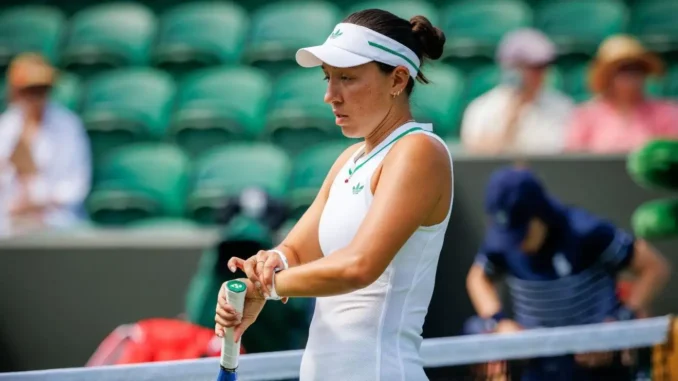
The 2025 National Bank Open in Montreal was poised to be a historic stage for Jessica Pegula, the two-time defending champion, as she aimed to become only the second woman in tournament history to secure a third consecutive title, following in the footsteps of Monica Seles. However, those dreams were shattered in a dramatic third-round upset on August 1, 2025, as world No. 386 Anastasija Sevastova staged a remarkable comeback to defeat the American No. 4 seed 3-6, 6-4, 6-1. The match, played at IGA Stadium, exposed vulnerabilities in Pegula’s game, prompting a candid admission of “sloppy” play that left her visibly frustrated and searching for answers as the US Open looms.
Pegula, ranked No. 4 in the world, entered the tournament with high expectations. Her 2025 season had been a blend of brilliance and inconsistency, with three WTA titles in Austin, Charleston, and Bad Homburg, where she notably defeated Iga Swiatek in the final. Her hard-court prowess, evidenced by a 75% win rate over 28 outdoor matches, made her a favorite to dominate in Montreal. After a first-round bye, Pegula opened her campaign with a hard-fought 7-5, 6-4 victory over Maria Sakkari, extending her Canadian Open win streak to 11 matches. Yet, against Sevastova, a 35-year-old Latvian veteran returning from maternity leave and a torn ACL, Pegula’s game unraveled in a way that stunned fans and analysts alike.
The match began with Pegula in control, breaking Sevastova in the first game and securing the opening set 6-3 with another break in the ninth game. She carried her momentum into the second set, taking a 2-0 lead. However, Sevastova, using a protected ranking to enter the main draw, found her rhythm. “Somehow, I was down 2-0 in the second set and started to play better and better,” Sevastova reflected, her words capturing the turning point. She broke Pegula three times in the second set, capitalizing on the American’s 63 unforced errors—her highest in a match this season—to level the score at 6-4. In the decisive third set, Sevastova was relentless, breaking Pegula’s serve three more times while saving nine of 13 break points against her. The final scoreline of 6-1 in the third set underscored Sevastova’s dominance, as she reached her first WTA 1000 Round of 16 since 2021.
Pegula’s post-match press conference revealed a player grappling with self-doubt. “It hasn’t been great, to be honest,” she admitted. “I don’t really feel like I’m playing great tennis. At times I am, but I feel very up and down, kind of sloppy, which I don’t like. It really bothers me. I’m kind of a perfectionist, so I don’t like having to say that.” Her frustration was palpable as she pinpointed a critical moment in the second set where she “played a couple of terrible games for like three games,” allowing Sevastova to seize control. Pegula’s 61.3% first-serve percentage and 45% break point conversion rate were no match for Sevastova’s tactical variety and resilience, which saw her convert six of ten break point opportunities.
This defeat marks a troubling trend for Pegula, who has now lost three of her last four matches, including early exits at Wimbledon to Elisabetta Cocciaretto and the Citi DC Open to Leylah Fernandez. Despite her stellar 36-15 record in 2025, her struggles at major tournaments—third round at the Australian Open, fourth round at Roland Garros, and a first-round loss at Wimbledon—raise concerns about her form heading into the Cincinnati Open and the US Open, where she reached the final in 2024. “I’ve gone through phases in my career like this, and you have to figure out how to get out of it and not feel sorry for yourself or make excuses,” Pegula said, signaling her determination to regroup. She emphasized her focus for Cincinnati: “Every single match is focusing on those big points and those big games because I do think I am playing some good tennis in these matches.”
Sevastova’s victory, meanwhile, is a testament to her remarkable comeback. After a year sidelined by injury and motherhood, her win over Pegula marks her first top-10 victory since defeating Serena Williams in 2018. “It’s a bit surreal. I didn’t think about winning all the match,” she said, highlighting her strategy to “stay as long as possible on court” and force Pegula into uncomfortable positions. Sevastova’s next challenge is a fourth-round clash with Naomi Osaka, who advanced with a 6-2, 6-4 win over Jelena Ostapenko.
For Pegula, the road ahead demands introspection and resilience. Her 90% win rate at the Canadian Open, the highest in any WTA 1000 event since 2009, now carries the sting of this upset. As she prepares for Cincinnati and the US Open, the 31-year-old must address the “sloppy” play that has derailed her recent performances, harnessing her perfectionist drive to reclaim her status as one of the tour’s most consistent players.
Leave a Reply